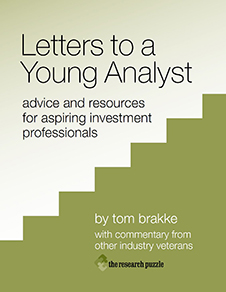
- Monday, October 26th, 2009
- situational awareness
-
Last week, a pair of pilots sailed past my local airport, somehow not receiving the frantic messages from a series of air traffic controllers that had expected them to descend and land there. Eventually they made their way back from neverland and once on the ground said that they had been distracted by an intense debate they were having about “airline policy” that caused them to lose “situational awareness.” It goes without saying that among the most important of airline policies are those designed to minimize the chances of misplacing such a valuable commodity.
While investment professionals may not be entrusted with the lives of their clients in the way that airlines are, we are charged with their financial well being, and a loss of situational awareness by us can be devastating for them. That is why recent events continue to ripple through the industry and will do so for many years. Faith was lost in many of the human pilots and there was no autopilot to avert calamity. The owners of target-date funds (with cool “glide paths” among other marketing hooks) were obvious casualties of that lost stewardship,the research puzzle | Here’s a piece I wrote at the beginning of the year about target-date funds. but the damage was much more widespread than that.
Two staples of the investment game, relative performance and relative valuation, play a large part in the periodic bouts of disorientation that imperil the industry and the profession. When everything is relative, it is easy to lose situational awareness. Shrinking time horizons and misplaced incentivesthe research puzzle | I did eight postings on this topic awhile back. have given career risk priority over prudence. Voices of reason and increasing alarm from the control tower are not heeded or not even heard.
Similarly, the smooth-flying business models and fat profit margins of financial companies weren’t questioned much either. This was especially true for the asset management firms, since they have proven to be wonderful money machines over time. But with fees largely based upon assets, the publicly-held managers have had very volatile stocks over the last two years, given the bumpy ride through the turbulence. Lately, we are starting to see more mergers and acquisitions in the business, which brings up an important question: Are you a buyer or a seller?
In the short term, of course, it depends on the performance of the various asset markets and the respective asset mixes of the firms. Beyond that, it seems that two issues are primary in considering whether the golden eggs will continue to be laid: Can firms that specialize in active management make the case for their services in the face of the ETF onslaught (and in light of their own weak records)? Were investors so badly harmed that they will change their behavior for good, rendering the old days, old ways, and old values irrelevant?
So far, cost cuts and better revenues from higher market prices have helped conceal the real issues. And new marketing campaigns (“let’s rebuild that nest egg together”) are being rolled out. It’s less clear how many firms realize how far off course they are and that the old maps and navigators may not get them to their destination.
